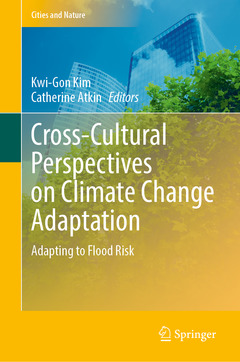Cross-Cultural Perspectives on Climate Change Adaptation, 1st ed. 2024 Adapting to Flood Risk Cities and Nature Series
Coordonnateurs : Kim Kwi-Gon, Atkin Catherine

This book offers integrated, actionable and culturally inclusive risk management and green recovery conceptual frameworks and methodologies based on case studies from communities across the global south.
Through its focus on flood disasters, this book provides an integrated approach to climate adaptation, green growth and mitigation that can unlock climate action and increase community resilience across the global south.Professor Kim, Kwi-Gon is an environmental ecological planner actively involving himself to the center of environmental and climate field where environmental problems have become global issues and green growth, a vision of nations.
He received his bachelor's degree in Forestry from Seoul National University, master's degree in Landscape Architecture at the University of Canterbury, New Zealand and master’s degree in Regional and Urban Planning Studies at the School of Planning, University of Reading, UK and a Ph. D. in Planning Studies at the Bartlett School of Architecture and Planning, UCL, University of London, UK. His current field of interest is planning and creation of Low- Carbon Ecopolis and Climate Smart Cities, ideal cities where human beings and nature coexist.
Catherine Atkin is an attorney, entrepreneur and urban planner committed to building equitable and effective climate solutions and leveraging the power of carbon data transparency and climate technology innovations to drive climate impact and sustainable development. She received a BA from Stanford University, a law degree from Berkeley School of Law (UCB) and a master’s degree in Urban Planning from University of California Los Angeles (UCLA). She is a member of the California Bar and a member of the California Lawyers Association Environmental Law Section.
She is Co-chair of the Stanford Law School CodeX Center for Legal Informatics Climate Data Policy Initiative and is an expert on national and sub-national GHG data policies and accounting frameworks with a special focus on how next-gen technologies like BC, AI and IoT can be leveraged for greater transparency and impact and is. She is co-chair of the UNFCCC Global Innovation Hub Consumption Based Accounting City Initiative Working Group where she is focused on the development of new GHG accounting and financing solutions that can catalyze sustainable and climate positive value chains.
Creates an integration platform theory and cases for climate solutions
Reflects on cultural dimensions of flooding risk management for cross-cultural practices for handling urban disaster
Applies digital technology for climate innovations including climate big data, AI, cloud computing and DLT/ Blockchain
Date de parution : 08-2024
Ouvrage de 330 p.
15.5x23.5 cm
